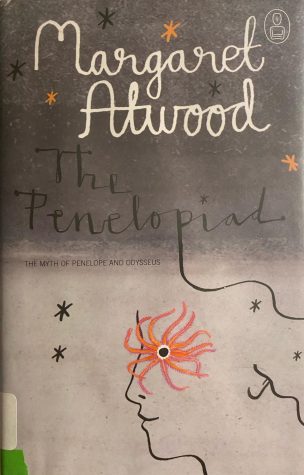Reed Books: The Penelopiad
December 6, 2020
Margaret Atwood is considered one of the most influential feminist authors in contemporary fiction, and her progressive retelling of Homer’s The Odyssey, through Penelope’s eyes, does nothing but confirm this. The Penelopiad is told in modern language, as Penelope is retelling the story to the reader from the afterlife, or the asphodel. The novel follows Penelope from before her marriage to Odysseus to the end of events in The Odyssey, occasionally interrupting with present-tense events from the afterlife. The focus of this story, made more obvious towards the end, is the twelve of Penelope’s maids who were hanged by Odysseus for sleeping with various suitors. With themes of slut-shaming, sexual assault, and other forms of misogyny, The Penelopiad manages to be light-heared at times.
One of the most compelling scenes in the novel is a faux courtroom scene, taking place in the afterlife, during which the twelve hanged maids seek justice against Odysseus for their murders. Its misogynistic overtones make the scene especially poignant in a post #MeToo world, despite the novel being published in 2005. After the judge hears the maids out, and the defense as well, he says, “It would be unfortunate if this regrettable but minor incident were allowed to stand as a blot on an otherwise exceedingly distinguished career” (182). The use of a man’s career, academic life, or athletic success is a common excuse used by legal professionals to not charge them of sexual assault. The words “minor incident” emphasize how little the judge actually cared about the case, despite it being twelve charges of murder. He dismisses the case out of court, and the maids, outraged, call on the Fates to plague Odysseus in all of his future lives.
Another aspect of the novel that really shows Atwood’s proficiency as an author is her ability to vary relationships between women. Often, female characters (or even celebrities) are pitted against each other; the patriarchy uses a “divide and conquer” technique to make sure women never reach the level of power needed to achieve their own freedom. However, Atwood shows that friendships (or enemyships) between women can take many forms. Penelope’s cousin, Helen of Troy, is beautiful, but vain and cruel, and Penelope always feels second to her, despite her intelligence. However, Atwood makes it clear that her beauty is not the issue; it is her foul personality that turns Penelope against her. Penelope respects Eurycleia, an older servant working in her home, and she comes to see her as a mother figure. Penelope’s closest relationships in the novel are those between her and her twelve closest maids, who she conspires with against the suitors. This is why their deaths have such a profound effect on Penelope; the only people she could fully trust, the all-female group of funny, intelligent, complex women are taken away from her by a man, and she is expected to be grateful, as any modest and dutiful wife should be.
Overall, Atwood’s modern retelling of such a classic story in The Penelopiad is a deep exploration of everyday feminism, and her use of misogynistic tropes and development of female relationships take this already enjoyable story to the next literary level.






















































